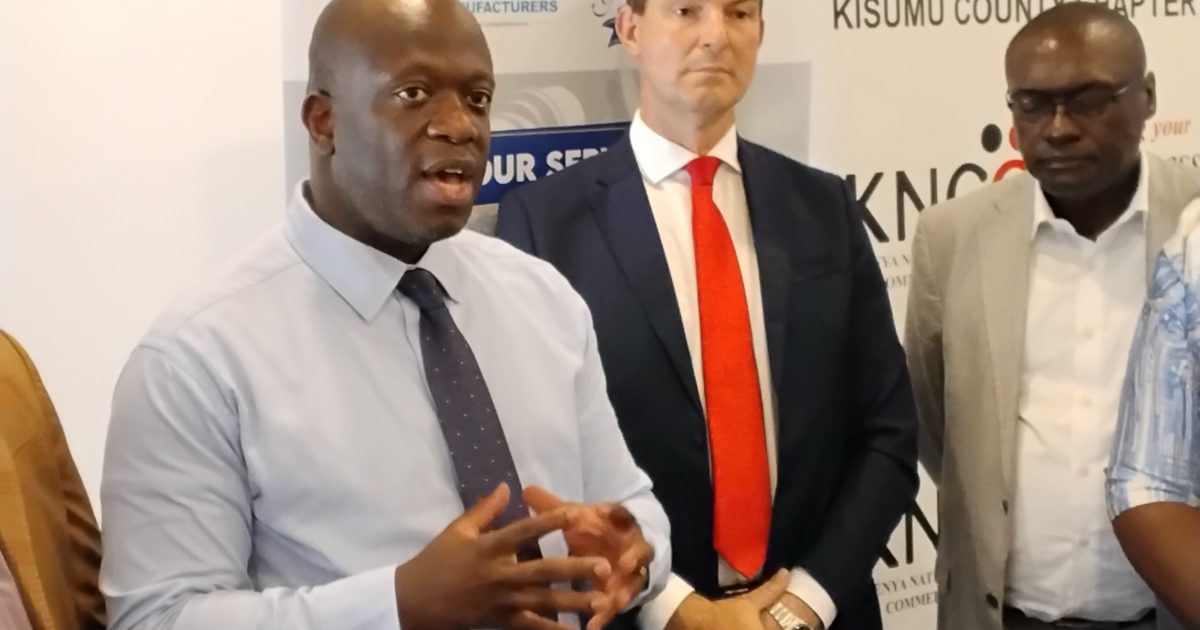State Department for Trade Principal Secretary (PS), Alfred K’ombudo, has urged traders in the Lake region, to take advantage of the European Union’s Economic Partnership Agreement (EU EPA), to access the expansive $16 trillion market.
The EPA which was signed on 18th December 2023, he said, presented a golden opportunity for farmers, traders, and businesses in the agricultural rich region, to reap big through exporting their produce to the 27 countries of the European Union (EU).
Through the agreement, the PS said, traders would enjoy duty-free-quota-free access to the EU market for Kenyan primary products, and all the manufactured products, which were not allowed to enter the EU market in the previous framework.
He added that the partnership which comes with a development cooperation component, to support Kenya to meet EU product requirements and build capacity for export, was set to stimulate economic growth in the country.
Speaking in Kisumu, Friday, during a sensitisation meeting for stakeholders drawn from Vihiga, Siaya and Kisumu counties, K’ombudo said the initiative was key in the implementation of the government’s Bottom-Up Economic Transformation Agenda (BETA), addressing gaps in access to markets for local products.
The Lake Region, he noted, was endowed with massive arable land, natural resources and adequate rainfall, challenging farmers in the area to diversify production and engage in value addition to reap big from the EU market.
“This is a golden opportunity for all the counties in the Lake Region, to diversify their exports, increase income, and empower local economies. We must rise to the occasion and position ourselves strategically to benefit from duty-free and quota-free access to the EU market,” he said.
The European Union, with a market value of USD 16 trillion, stands as one of Kenya’s largest export market, accounting for an average of 21.1% of the country’s total exports annually.
Current Kenya’s Exports to the EU comprises largely agricultural commodities, including live plants and cut flowers, coffee, tea and spices, edible fruits and nuts, edible vegetables, ores, fish and crustaceans, oil seeds, animal and vegetable fats among other agricultural products.
Blue economy, the PS, said was a potential area which has not been fully exploited with Kenya’s share of fish products export to the EU, amounting only to 0.04% of the 48 billion dollars fish market.
“As a blue economy region that is well endowed with fish products and good transport system, counties in the lake region can leverage on this to acquire a larger fish exports market share in the EU,” he said.
To support farmers and traders export in bulk, the PS said the State Department for Trade was in the process of establishing a Multi-Commodity Exchange, to connect warehouses with farmers and traders, facilitating bulk aggregation of goods to meet market demands.
This, he said, was a critical step in addressing challenges faced by farmers and traders, particularly the inability to satisfy large-scale orders due to fragmented production and distribution systems.
EU Trade Counsellor, Filippo Amato, said the sensitisation meeting which is the 7th to be held in the country, was critical in creating awareness on the new trading opportunities between Kenya and the EU.
Kenya, he said, has taken the lead in expanding trade opportunities with the EU, calling on other East Africa Member States to take cue.
“The European Union is very delighted to have this agreement with Kenya, following years of negotiations. We are hoping that the other countries will also do the same,” he said.
The agricultural products exports market, which is a shift from the traditional oil and minerals export, he said, offers a big opportunity for Kenya and other African countries, urging farmers to add value to their products, to reach a wider market.
Vihiga County Executive Committee Member (CECM)-In-Charge of Trade Joseph Lunani, said county governments were plugging into the National government’s Bottom-Up Economic Transformation Agenda (BETA), adding that the expansion of markets through the EU partnership presents a golden opportunity for farmers and traders in the counties.
By Chris Mahandara



